Man, 40 of these stupid things. No witty comment, just: man.
Anatomy of a Murder

One of a pair of long courtroom dramas I saw this last week, and one of a pair of movies starring James Stewart. He plays an aging lawyer who despite being out of practice, agrees to defend a soldier who murdered a man after he supposedly raped his wife. Strictly, the rape wouldn't be enough to qualify the killing as self defense, but Stewart uses it as leverage to help push a plea of temporary insanity. The film examines how precarious the legal system is, requiring the jury to ignore information they have been given and having cases rely on the always unreliable human ability to lie or accurately remember what happened. There's some terrific acting, and it's interesting how the truth is not what's important, but rather the trial itself.
Harvey

Another really good James Stewart performance, one that props up a movie that is watchable but I wasn't particularly drawn to. He plays a man with a friend named Harvey who happens to be an invisible six foot tall rabbit. Everyone thinks he's crazy, even his sister, who may or may not also be able to see Harvey. Various people act like assholes towards Stewart, but in the end things turn out okay because blah blah whatever.
Judgment at Nuremberg

A movie about one of the infamous trials at Nuremberg, where four judges are put on trial for rulings they made during the Nazi rule of Germany. It's undeniable that they made decisions that contributed toward the horrible things that happened under the Nazis, but the defense makes a great case that they are no more culpable than other people who didn't actively work against the regime and even other governments that didn't stop them earlier. Maximilian Schell actually won an Oscar for his depiction of the defense attorney, and he was quite good, though personally I preferred the more subtle work of Spencer Tracy as the chief judge on the tribunal. It's important to be reminded sometimes of just how awful the Holocaust was.
Stripes

A pre-Ghostbusters Ivan Reitman/Bill Murray/Harold Ramis joint that substitutes cursing, nudity, and general silliness for true wit or an intriguing premise. There's something still likable about Bill Murray's dickishness, but I thought overall Stripes was pretty uninspired as a comedy, although that doesn't prevent it from being pretty watchable anyway. It has a fine cast, including John Candy and Judge Reinhold as two of the more recognizable supporting members. Really, there's nothing terrible about it, I was just hoping for more from its talented core.
Sunday, February 26, 2012
Movie Update 40
Monday, February 6, 2012
Movie Update 38
Hey, how about I write a little bit about some movies I saw recently and then you can decide whether or not you agree with me.
Lethal Weapon 2

I have to admit I kind of miss movies like this - big summer blockbusters that don't rely on high concept science fiction to get their thrills. It's not that I don't like science fiction, obviously, I just miss action movies that aren't about superheroes or robots or vampires or whatever. Lethal Weapon 2 isn't even that spectacular - it's just a solid buddy cop movie with a enjoyable rapport among the main characters and some fun, bloody action scenes. But that's all it really had to be. I'm glad I watched it.
Peggy Sue Got Married
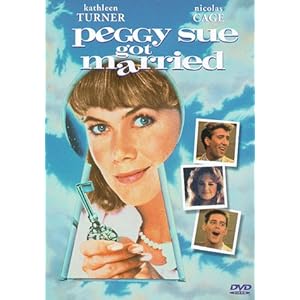
I don't know how many times I can keep saying that Francis Coppola had a strange career after the 70s, but it's still true. Back to the Future got the lasting attention, but Peggy Sue Got Married is another time traveling 80s high school comedy thing, starring Kathleen Turner as a woman who loses consciousness at her 25th high school reunion and wakes up as a 17 year old again, determined to make different choices and not even sure that any of it is actually real. The movie plays up the drama a fair bit and is less wacky than most movies of its sort, but its highlight is definitely Nicolas Cage, from his hair to his bizarre voice to his whole demeanor. Odd, but more fun than most of Coppola's other odd movies.
Shane

I believe this is the final film from AFI's revised version of the 100 best American movies that I've seen, and it's a pretty good one. Alan Ladd stars as the titular character, a gunman who tries settling down with some farmers out West, but finds he is unable to escape his past when they get increasingly harrassed by men who want control of the whole territory. There's an annoying kid who comes close to ruining the movie on a number of occasions, but it manages to survive as a classic example of a solid but not great 50s Western.
Speed

Another fine example of a blockbuster action movie that didn't need an impossible concept to work, although it does rely pretty heavily on a gimmick. I know I'm one of the last people to see this movie, and I don't need to tell you what it's about, but I will say the movie does a pretty good job of adhering to a traditional and workable story structure despite a great deal of it taking place on a speeding bus. There's very little in the way of real human on human violence, but due to the clever exploitation of the plot's strange circumstances and the chemistry of the main cast it remains exciting for most of its duration. I liked it more than I expected to in any case, and Keanu Reeves' bad acting is in fine form.
Sunday, January 29, 2012
Movie Update 37
You know what's up.
Crimewave

This is the only produced Coen brothers script that the brothers didn't direct themselves, though the duties were taken by their friend Sam Raimi. It combines elements of both of their careers in film, and combines them to create what might be best described as a live action Looney Tunes movie. The subject matter is darker, but the actual content of the film really isn't. When a man hires a couple of goons with silly voices to kill his business partner after finding out about his betrayal, they end up going on a rampage through the city, with one of the man's employees and a girl he meets getting caught up in it. It's a very strange and silly movie, with some very elaborate comedic setups, surprisingly exciting moments of action, and an entertaining appearance by Bruce Campbell. A bizarre film that you'll probably like if you're a fan of the filmmakers involved.
Dracula
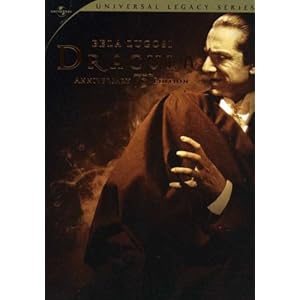
It's always interesting to me how sterile and stately the horror films of the 20s and 30s are. Genre icon Bela Lugosi stars in his signature role, instilling Dracula with charm and menace as he moves from Transylvania to London in order suck a lot of blood. It's of course pretty toothless in comparison to modern vampire stories, but I mostly enjoyed the slow discovery by the other characters of what Dracula really is and their calm attempts to prevent him from killing or enslaving any more women. Heh, toothless.
One from the Heart

Post-70s Francis Ford Coppola continues to make absolutely no sense to me. One from the Heart tells the story of a couple in Las Vegas that finds their relationship falling apart, and their struggles to either resolve their differences and move on with their lives. What makes the movie different is its musical quality - the characters don't really sing, but the original music by Tom Waits pervades the whole thing, it frequently dabbles in an unreal sense of space, and the film is entirely and totally obviously filmed on elaborate sets at a soundstage. The movie's budget problems and failure at the box office cost Coppola a ton of money, and a lot of his career from then on can be attributed to continued financial problems. Was it worth it? Uh, not really. The movie is okay.
Witness for the Prosecution

A courtroom drama directed by Billy Wilder, based on a play, based on a story by Agatha Christie. Other actors get higher billing, but the star of the show is definitely Charles Laughton, an aging English lawyer who was recently released from the hospital and decides to take on the defense of a man accused of murder, against his doctors' wishes. The trial itself is pretty straightforward, until the characters start making unexpected choices and Laughton has to stay on his feet to deal with the changes and continue the defense to his best ability. The ending is so twisty that a voice actually advises the audience to avoid spoiling it to their friends so they can enjoy it too. It's a well-made and wonderfully acted legal drama that wraps up satisfyingly without letting anything come too easily.
Friday, December 23, 2011
Midnight in Paris
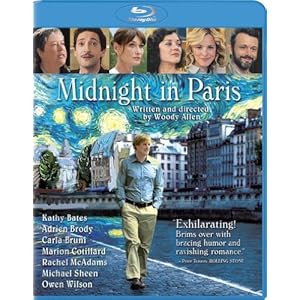
Somehow this is the only Woody Allen movie I've seen that's been released since 1989, though my Netflix queue tells me that will change soon. He doesn't appear to have changed that much as a writer or director since then, though I've gotten the impression that this is his best work in a while, and since it wasn't actually all that great, it makes me wonder how much he's slipped. Midnight in Paris isn't bad at all, and in truth I enjoyed most of it. But there are some things about it that bothered me too, and it really isn't anything new for him.
The most surprising thing about the film is its fantasy premise, which I didn't really know about. Owen Wilson is a stand-in for the definitely-too-old Allen, playing a pretty standard Allen character - a Hollywood writer who hates his job and would prefer to be a novelist. While on vacation with his fiancé and her parents in Paris, you see many cracks in their relationship. They don't fundamentally agree on most things, and you question how they got together in the first place. He's hopelessly romantic about the city and the past and being a real artist, and she wants nothing to do with it. But then while on a walk at night he gets into an old car with some people and taken to a party where he meets many famous artists from the period he's nostalgic for, from Ernest Hemingway to Pablo Picasso. At first I thought it was just a costume party or something, but before too long it's apparent that he's actually somehow visiting another time. By day he fakes being interested in what his future wife is doing, but by night he's showing his writing to Gertrude Stein and falling in love with a woman played by Marion Cotillard.
It's kind of an odd story, but it's an effective one about career and life in general, how we may not always be totally happy and satisfied, but maybe we're not supposed to be, and trying to hide in the past isn't a good way to deal with it. I liked how Wilson's relationship with Cotillard eventually allows him to learn what he needs to, and while it's not exactly the funniest comedy, there's some pretty enjoyable scenes. It's fun playing spot the famous person, both in the older artists being portrayed and the actors playing them. My favorite was Adrien Brody playing a Salvador Dali who's apparently become obsessed with rhinoceroses.
As I said though, there were flaws too, most notably perhaps being that the film is so yellow that I was often distracted by it. I understand wanting to create an aesthetic, but I'm pretty sure Paris isn't that damn yellow in any time period. The characters also often seem underwritten, or not fully thought through. Owen does a decent job with the character, and has a few genuinely very good acting moments, but it's sometimes hard to like him when he acts like one of the most deluded and unreasonable people ever. Actually experiencing time travel only gets you so far. And I think the story of his obsession and drifting away from real life would have been more effective if the people in it weren't so shitty. His fiancé and her parents and her know-it-all friend are completely unsympathetic. The actors are fine, they're just written to be villains, and I don't think it helped the story. If you were with someone who started talking about how they were going off at night and partying with Hemingway, you probably wouldn't react well either. Midnight in Paris is a fine movie, but it's far from Allen's best work.
Saturday, December 3, 2011
Movie Update 31
Crank: High Voltage

Remember when I said that the original Crank was actually less over the top and insane than it advertised itself as? This sequel, which brings back most of the significant characters in some way and attempts to escalate on everything the first movie did, corrects that issue. Instead of having to keep his heart rate up by doing things like getting into fights and having sex with Amy Smart, Jason Statham's heart has been replaced with an artificial one and he must keep its battery charged by doing things like electrocuting himself and having sex with Amy Smart (because it generates static electricity through friction, obviously). There's a lot more violence and nudity and general zaniness in this movie, so it succeeds at surpassing the first movie in that way. It does have a different problem though, which again prevented me from really liking the movie - it just seemed too mean-spirited. People don't just get hit in the nuts, their genitals get destroyed. A man is forced to punish himself for messing up by graphically cutting off his own nipples. Just lots of messed up stuff like that, and I thought it was usually more gross than entertaining. Otherwise, it's as kinetic and crazy as advertised, with a few moments of inspired originality.
Hoosiers
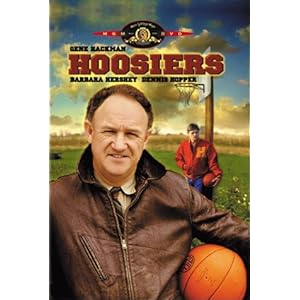
Hoosiers is as predictable an underdog sports story as you're ever likely to encounter. Gene Hackman comes to a small Indiana town to become the high school basketball coach, and he struggles to gain the acceptance of the locals before molding the team into an unlikely winner, more successful than they've ever been before. Dennis Hopper plays the father of one of the players, a drunk and embarrassment to the town who actually knows a lot about the sport. Barbara Hershey is a teacher at the school who questions Hackman's methods but eventually warms up to him. There's a kid who's supremely talented but unwilling to play, and a bunch of ignoramuses who have it out for the interloper. Though it's nothing you haven't seen a bunch of times, Hoosiers is still a charming and well-executed version of that formula. The acting is solid, and the basketball scenes are authentic and exciting. It was a bit weird for the only black people in the movie to appear at the end as players for the big bad final opponent (the movie takes place in the 50s), but otherwise there's not much to really hold against the movie. Pretty likable stuff.
The Russians Are Coming, the Russians Are Coming
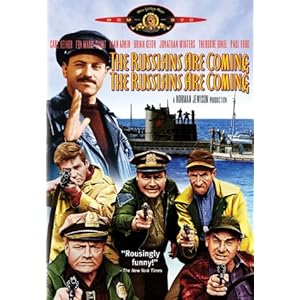
A weird mix of comedy and politics, The Russians Are Coming tells the story of a Soviet submarine crew that accidentally runs aground on an American island and attempts to get back in the water without causing an international incident. Unfortunately, they run into difficulties, and things are exacerbated by the locals who are alarmist about the threat and quick to gossip. Things almost totally boil over in a remarkably tension-filled stand-off before the film remembers it's a comedy and deflates it in a pretty cheesy, feel-good way. It's a likable movie, with some frustrating side characters and maybe too long a running time but not much else to complain about. The best part is probably Alan Arkin's lead performance as one of the Russian crew members, who doesn't actually get a ton of dialogue but when he does always manages to make a lot out of very little. I'm honestly not totally sure what it was trying to accomplish, but it's a pretty good movie.
Tom Jones
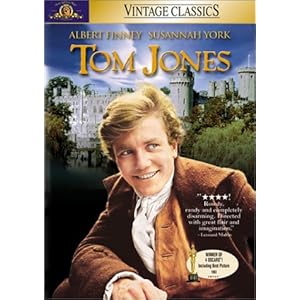
There's something about 18th century England that is just inherently interesting to me. The British accents, the horrible class inequality, the technology still stuck in the beginnings of the Industrial Revolution, it's just... I don't know. Interesting. Tom Jones is based on a serialized novel published during that period, and features Albert Finney playing a bastard who's been raised in kind society and grown up to be a womanizer, well-liked by many but hated by some. The movie actually won Best Picture, which seems kind of strange, but I guess movies could do that back then without being dramas about serious issues or mediocre. Wow that was pretty harsh, I've actually really liked most of the recent winners of that award. Oh well, whatever. Tom Jones is funny, has an intriguing little plot about the secrets people sometimes keep, and has some nice performances. It also frequently features characters talking to or just looking at the camera, which somehow never gets old. And now that the movie has expired from Netflix streaming, the site doesn't have it at all. What's up with that, Netflix?
Monday, November 28, 2011
Hugo

A lot of people were loudly skeptical when they heard that Martin Scorsese would be directing a 3D family movie, but for some reason I wasn't. The main things I thought were that his films are successful because they are well crafted, not because they're violent, and he is a strongly visual director, so he could probably handle the third dimension as well as anyone in the business. Both of these proved to be true when I saw Hugo, based on a book that weaves a small part of the real history of film into a nice story about a young boy who finally makes some friends.
Hugo Cabret is a young orphan who lives in the walls of a Paris train station, and is left to maintain the building's clocks on his own when his drunk uncle skips town. He's also trying to repair a broken automaton that his father found in a museum and was working on before he died, and his quest to do so introduces him to Ben Kingsley's character, the owner of a small toy shop in the station, and his adoptive daughter played by Chloë Moretz, who loves reading but has never seen a movie. He takes her to the theater, and shows her the automaton, and they eventually stumble into revelations that that bring the seemingly disparate elements of a broken robot and the love of film together.
Visually the film is pretty stunning, whether you see it in 3D or 2D, though I saw the former. The sets and costumes are impeccably gorgeous on their own, and the depth from the 3D further brings the world to life in a pretty incredible way. I was definitely more impressed than I was by Avatar. This movie proved to me that the argument that 2D film is inherently superior because it is more dreamlike is absolute garbage. The visuals in this movie make it seem almost like it's animation even though it was filmed with live actors, and they bring you into a fantasy setting that doesn't seem real, but much more imaginative and fun than that. I don't like the over-saturation of 3D in the theater market, because most films aren't made with it in mind and don't seem to really benefit from the process. But Hugo was made to be shown this way, and the effect is great at pulling you into this other place, in the same way that many people probably felt when they watched a movie for the first time.
In a funny way, that 3D thing does really well to tie into the idea of the dawn of filmmaking and the newness of the concept when the film takes place. It's a couple decades after the cinema had become commonplace, but the characters do a good deal of digging into the medium's origins, and a good portion of the running time is just devoted to celebration of the art form. Scorsese is a big proponent of film preservation and film in general, so it makes perfect sense for him to get attached to this concept, almost to the detriment of the main plot of the movie. There were some flaws with the movie that detracted from the overall good feeling I got from the experience. I thought Asa Butterfield's performance was a little uneven, and while I liked Sacha Baron Cohen's inspector character, he only seemed to be in the movie because the story needed an antagonist. I definitely liked him more when he was awkwardly trying to be friendly than when he was the villain rounding up orphans.
And for a family movie, I don't know how much kids would actually like it. A good deal of what's interesting about the film is referential to things they probably wouldn't understand, and it was neither terribly funny not terribly exciting most of the time. There were a couple really fun moments, but what I liked most about the movie was the setting it created, and pretty much every kid's movie is decent enough at that. But if you enjoy Scorsese as a filmmaker, and still have a sense of wonder, and an appreciation for the history of human entertainment, you'll probably like the movie a lot.
Saturday, November 26, 2011
Movie Update 30
Here are some Alfred Hitchcock movies! And a couple others too I guess!
Blackmail

Alfred Hitchcock's first sound film is a pretty decent one. It features a lot of elements that would become his signatures - normal people in great distress, tension building as the result of bad decisions, dramatic climaxes in famous locations. It also seems remarkably dark for the period, with the plot kicking into full gear as the result of murder to avoid a sexual assault. It still feels like a silent movie in some ways, with many scenes going on for ages with little happening, but Hitchcock shows a lot of ability in not just his first attempt at a sound picture, but one of the first ever.
Chicago
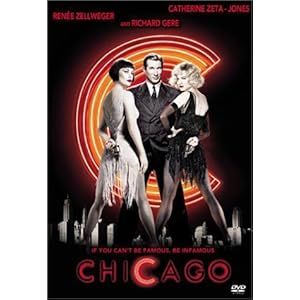
Chicago is a pretty poor choice for Best Picture, not just in its year but probably most. Laughable, even. But it's not a bad movie. I have a feeling the voters wanted to give the award to a musical again, and the most acclaimed one since Cabaret was a decent opportunity. It's actually sort of the opposite of that film stylistically, with most of its musical numbers being fantasies in the protagonist's head rather than regular performances at an actual music club, but that's not really terribly important. The plot is simple and I have no idea why I'm actually supposed to be sympathetic with Renée Zellweger's character, and some of the pieces being a bit simple for the medium of film. But the acting is pretty good and there's an energy to the movie that's enjoyable to watch. Definitely not bad.
Easy Virtue

An even earlier Hitchcock movie, still stuck in the silent era, and unfortunately this one doesn't show a whole lot of skill from the Master. My main problem with the movie is that nothing happens in it. It begins with a woman going through a messy divorce, and then she meets a new man somewhere else, but eventually her past catches up to her. There's nothing really interesting about any of it, the fallout isn't exactly dramatic and the movie doesn't even really seem to care if you're sympathetic or not. All it really seems to be saying is that women shouldn't do inappropriate things if they want to be happy. Which uh... okay?
Foreign Correspondent
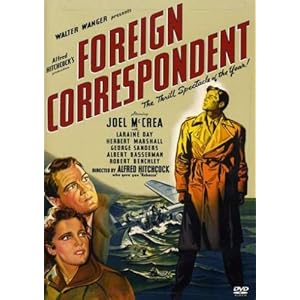
Released the same year as Rebecca, Foreign Correspondent isn't as good, but it's still a solid example of what Hitchcock could pretty much do in his sleep. A reporter gets caught up in a web of spying and secrets that could eventually lead to a World War (paralleling the one that was actually happening), but his ability to tell the truth is compromised when he falls for a girl who's a little too close to the conspiracy. It's one of the weaker American films I've seen by him, but I eventually warmed up to it, especially after its surprisingly exciting climax. It's really more comedic than his work tends to be, maybe because Joel McRea is the lead, and it took me some time to adjust, but it's a fine little international caper.
Rumble Fish

Boy, Francis Ford Coppola's post-70s career is hard to get a bead on. It almost seems like he's a different person. A lot like Tetro, Rumble Fish is a black and white film with splashes of color that partially exists to examine the director's own relationship with his older brother. Matt Dillon plays a young punk who looks up to his brother, played by Mickey Rourke, and who has difficulty finding a way to fit in with the world around him. He hangs out with friends at a pool hall, gets into gang fights, and treats his girlfriend played by Diane Lane like crap. Eventually things start going badly for him, and I can't say I really minded. It's just kind of a weird movie, but some parts worked well enough that I wasn't bored.
Monday, November 14, 2011
Movie Update 29
Well, here we are again.
The Castle of Cagliostro
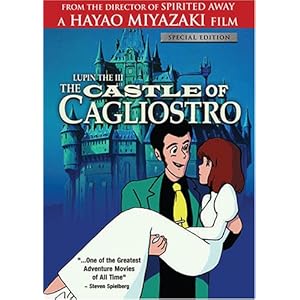
Hayao Miyazaki's first film as a director, before Studio Ghibli was a thing, is based on the Lupin III television series he worked on, which was based on a manga created by Monkey Punch, which was inspired by the Arsène Lupin character created by Maurice LeBlanc. The film's plot is also based on one of the original Lupin stories. So yeah, there's a lot of adapting going on here. Cagliostro is a lighthearted action adventure about Lupin and his buddies stumbling on the world's biggest counterfeit currency operation in one of its smallest countries, and trying to both thwart their plans and rescue a princess at the same time. I've only seen a bit of the show, but it doesn't take much of that to get familiar with the principal characters, and they all show up here and have fun little parts to play. It's a simple movie, but there's a nice energy to it, a reasonable amount of excitement in the twists and turns, and like all works by Miyazaki there's a nice feeling to the animation, which isn't the most fluid ever but does what's required to set the right tone. It's kind of a standard adventure movie, but it's a well executed one.
Killer's Kiss

Not Stanley Kubrick's first feature film, but the first that's readily available for public consumption. It's also his weakest that I've seen. There's nothing very bad about the movie, but there's just not much to it. A boxer meets up with a dancing girl, and they try to leave the city and start a life somewhere, but her crook of a boss isn't a fan of the idea. It's a pretty bare-bones noir story, with the only thing that really makes it work being Kubrick's great photography. There's lots of great little shots that stick out as distinct for the era, including use of reflections, some stuff with shadows that I haven't really seen before, and a memorable conclusion in an unusual setting. There's not much to the characters though, and the tacked-on ending doesn't really work. Its only real use is to show the potential Kubrick had for his work later on.
The Killing
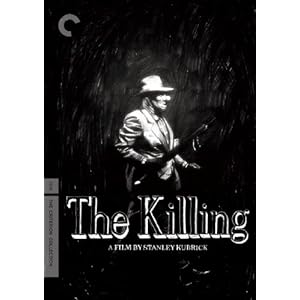
The very next year Kubrick made this, his first really good movie. It actually feels a bit less distinctly his than Kiss, but it's certainly a lot more fun to watch, and might actually be the most purely enjoyable movie he ever made. In one of the few instances I can think of of him using an actor more than once, he has Sterling Hayden as the main character, a criminal trying to pull off one last job, robbing the take at a horse track, with a complicated scheme that involves multiple people both inside and outside the place. It's a pretty good plan, though there's also a lot of moving parts, and of course things get screwed up and the situation eventually gets pretty hairy. There's a lot of build up, and the pay off when it all starts falling into place is pretty great. Stylistically, there's not much in the movie that wouldn't be in another noir movie from the period. But it's also just a really good example of the genre, and sometimes that's all you need to be successful.
The Tree of Life
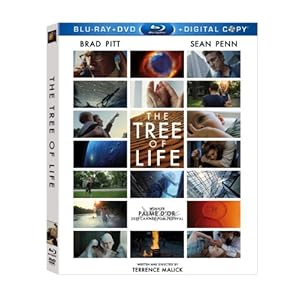
This is a film about life, and growing up, and pretty much everything that entails. I said before that I imagine a film by Terrence Malick entirely in his reflective/observing-nature's-beauty mode might get tedious, and that's somewhat true here, but the film is so beautiful and poignant that it's hard to be really bothered by the slow bits. The film isn't exactly in chronological order, but what it's basically about is Sean Penn remembering his youth growing up with his parents and two brothers, and also experiencing some sort of vision of the birth of the universe and what possibly lies beyond it. It's a staggeringly gorgeous movie at times, especially in the scenes showing the early moments of existence, with visuals that avoid computer animation in favor of more natural means. The more normal stuff looks great too, though it's mostly just people walking through houses or the woods. Brad Pitt plays his father, and does a really great job making him into a terrible dad that should really be feared and despised without being over the top about it. Just the way he touches his sons on the neck is enough to establish that loving parenting doesn't come naturally to him. I don't think the movie needed a name like Penn to play the adult version of the main character though - he doesn't really do much acting besides walking around and looking at things. The Tree of Life is a bit ponderous and in love with itself at times, but what it does right is memorable and unique enough to make the film worth watching, especially if you're a fan of film as a visually artistic medium.
Monday, October 31, 2011
Gangs of New York
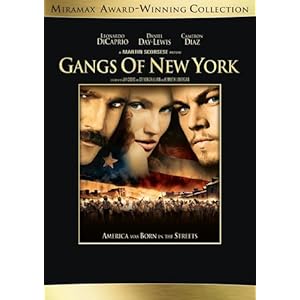
I'll be honest, I usually find historical epics to be pretty boring. Even the good ones could use some trimming. Leave it to Martin Scorsese though to create one that's gripping from the first second of its nearly three hour running time to the last. It tells the story of New York City before it became the mecca of human civilization it is today, when the streets still ran red with the blood of the many warring factions that vied for influence and their many victims. The film isn't a true story, but besides some embellishments it may as well have been. It stars Leonardo DiCaprio in his first of four collaborations with Scorsese as the son of an Irish immigrant and leader of the Dead Rabbits, and Daniel Day-Lewis as Bill the Butcher, the man who killed him. It starts with a war between two gangs for control of Five Points, a district in the city where the poor make do. The extremely bloody battle sets the tone for the rest of the film, establishing its main characters and their later motivations, as the plot quickly jumps forward to when DiCaprio's character has grown up.
The two best things about the movie are easily Scorsese's direction combined with the amazing work done to recreate 1800s New York and capture it on film, and Day-Lewis' performance. You could pretty much cut the protagonist out of the film and it could just be a great story about a leader of both crime and community in a city as it slowly develops into something resembling modern society. That's not really to slight DiCaprio, that's just how good Day-Lewis is. There's just something cool about the place the film creates, filled with hard men with curly mustaches, top hats, and razors and knives tucked into their clothing. And he epitomizes it with his glass eye and inscrutable nature. You never know if he's going to cut your throat or give you a pat on the shoulder. DiCaprio has his romantic foil, played by Cameron Diaz, can't quite measure up to his work, though they're perfectly fine otherwise.
The supporting cast is fantastic too, featuring recognizable faces in a variety of roles, supporting various sides as they see fit. Liam Neeson brings plenty of gravitas to the couple scenes in the beginning where he plays DiCaprio's father, which lends weight to later scenes where Bill shows clear ongoing respect for his former foe. The small time crew DiCaprio runs with features Al Capone from Boardwalk Empire and D'Angelo from The Wire, and Brendan Gleeson and John C. Reilly give interesting performances as former allies of Neeson who may no longer agree with his ideas. The film isn't without problems, of course. The entire third act is pretty messy, as though the screenwriters lost momentum and had to basically force things to make sure they managed to check off all the plot details they needed to to reach their conclusion. And that conclusion, while thematically appropriate, does result in a rather unfortunate anticlimax of an ending. With Scorsese at the helm though, all of those individual scenes manage to be good if not great, and he makes the problematic ending work because it's very clear what they're going for. He just knows how to make great movies, and this is certainly one of them.
Sunday, October 30, 2011
Movie Update 27
Three movie posts in a row? What the hell is this?
Assault on Precinct 13
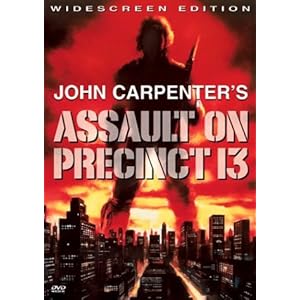
A pretty early John Carpenter film, which can be seen as a super violent action movie before super violent action movies were really a thing. It has elements of westerns and zombie movies, and tells the story of a few police officers and criminals defending a closed-down police station from a fraternity of gangs on the warpath. There are definitely bits of the movie I liked a lot, as it manages to build suspense and have some solidly exciting scenes despite a low budget. There are definite issues with the script though, which is a bit lean in some places and is filled with tough action dialogue that I could barely tolerate, especially for the lead good guy criminal. Stop being cute and act like a human being for five minutes, man.
Going My Way

A Best Picture winner starring Bing Crosby as a priest who comes to a new church and helps make it a nicer place, mostly by using his musical talent to keep it going and form a choir with its population of young boys. There's not really a lot of depth to the movie, but I found it mostly enjoyable. On occasion the musical numbers (it's not really a musical, but does have a lot of singing) seemed to go on a bit long, but in the end it's a nice tale of spirituality and kindness and whatever. I like Bing. Bing's a pretty cool dude.
Last Year at Marienbad
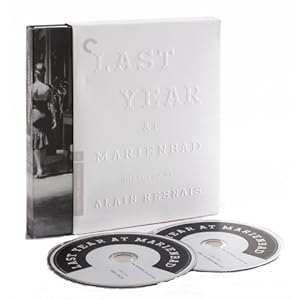
When people talk about incomprehensible foreign art films, this is basically exactly what they're talking about. Marienbad is a French movie about a man who tries to convince a woman that they had met and had an affair a year earlier at another place, and either he's making it all up or she just forgot somehow or she's deliberately pretending she doesn't know what he's talking about. The movie never really explains itself, and I don't think there really is a straight answer anywhere. It's not that the scenes don't follow or are made up of gibberish, it's just that it's really difficult to tell when things are taking place or where or what's real or if any of it is. I appreciated the great artistry that went into filming it, but I also can't say I really liked it. There's just no way to make heads or tails of it.
The Long Goodbye
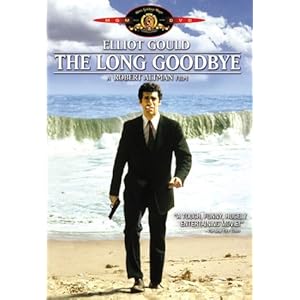
My favorite classic film noir might be The Big Sleep, starring Humphrey Bogart as Philip Marlowe. Robert Altman and Elliot Gould revived the character in the 70s with The Long Goodbye, moving him into that decade and highlighting the anachronism of a 40s hardboiled detective living in a then-modern LA. Some people don't like the way the movie plays with the genre or the deviations from the original novel, but I thought it was a mostly entertaining movie. It's also funny to see a very early appearance by Arnold Schwarzenegger as a thug who doesn't have any lines. Not a traditional detective story, but I think it's an interesting one.
The Phantom of the Opera
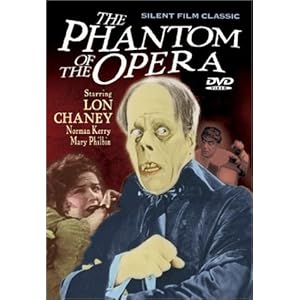
You know, I always got the impression that the Phantom was supposed to be a sympathetic figure, like his horrible visage masked a kindness and he was only secretive because of a life of torment, or something like that. But he really isn't. He kidnaps a woman and basically tells her he'll kill everyone if she goes back to her boyfriend instead of staying with him. Not cool, dude. This version of the story from the 20s is probably the best known film version, and it's pretty watchable, though not terribly exciting now. Lon Chaney's makeup is pretty good, but there's not much about the movie that's really scary. Not much of the good imagery from other silent horror classics. Still, probably worth checking out.
The Private Life of Sherlock Holmes

I guess there's some disappointment that when Billy Wilder makes a Sherlock Holmes movie that begins by teasing that its story will be surprising and possibly controversial, and the ends up just being a pretty normal Sherlock Holmes movie. In fact, the entire opening sequence where he lies about his sexuality to get out of a jam and which is the only thing that's truly original about the story, ends up being kind of a waste of time as it only barely plays into the rest of the film. It's not a big deal though, because it's a well paced, interesting mystery for Holmes and Watson to solve, with plenty of clues that seem odd at first but end up coming together to make a strange sort of sense. No Moriarty here, but we do have Christopher Lee as Mycroft, which is pretty delightful. Not an outstanding movie but a fun one. Not sure about the new Guy Ritchie sequel, though. Is it just me, or are none of the jokes in the previews actually funny?
Rome, Open City
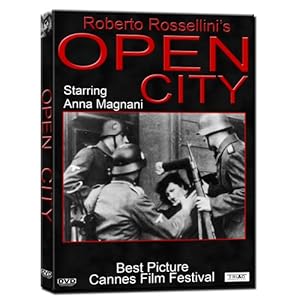
Italian neorealism! Catch the fever! Open City is remarkable for its depiction of the late Nazi occupation in Italy only months after the war actually ended, and for how unflinching it is in depicting the period. They didn't experience some of the worst horrors of the war, but it sure wasn't fun to resist the Third Reich at any point during their reign. The film suffers a bit from Italians Yelling a Lot Syndrome, but it's a well crafted piece of historical fiction, and I'm still impressed by it following so soon after the actual events it tries to reflect. A solid way to help kick off an important film movement.
Monday, October 24, 2011
Movie Update 25
Seems sometimes like all I do is watch movies. But that's not true.
Amarcord
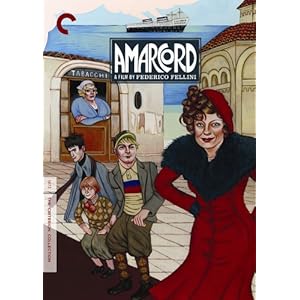
One of two films by Federico Fellini I saw this weekend, and the first I've seen in color. It's more autobiographical than his other work that I've seen, and thus more prone to not actually having a plot. It shows the crisscrossing lives of many people living in a small Italian village over the course of about a year during Mussolini's time as dictator. It pokes a lot of fun at the politics at the time, when it's not just depicting small town living. It's a fairly amusing film, but it didn't really grab me. I'm not against simple slice of life stories, but for whatever reason I wasn't really drawn into this one. Nicely done, but not much impact.
Au Hasard Balthazar

A good way to depict suffering and cruelty is to inflict it on something that's completely innocent, and that's what Robert Bresson does in Balthazar. It shows the parallel lives of a young farm girl and her family's pet donkey, as they grow older and face the harsh realities of growing up and being subject to the whims of someone stronger than you. I focused mostly on the donkey, just because it's such a pitiable creature and it's hard to watch what people do to it just because they can. If you want a prime example of a foreign art house movie that shows what's wrong with humanity without hitting you over the head with it... well, here you are.
Rio Bravo

Rio Bravo was made as a response to High Noon, which some such as Bravo's star John Wayne saw as un-American. It has a similar premise of the sheriff of a small, dusty town facing the looming threat of a criminal preparing to come and cause trouble, but rather than asking the town he protects for help, he faces the threat head-on. Of course, he has a couple buddies who are even better with a gun than him, and in general the town just treats him better. I liked Rio Bravo about as much as High Noon. Its approach is different, but it's a more entertaining, if less intense Western. The cast is solid, and Howard Hawks' direction is spot on. I liked High Noon because it was different from most films of its type at the time, but there's value to something just being well made too.
Stagecoach

John Ford's first sound Western, and the breakthrough movie for John Wayne. Solid character actors like John Carradine and an Oscar-winning Thomas Mitchell appear as well in nice roles. A stagecoach tries to make it through Apache territory to a town where Wayne's Ringo Kid intends to face down the man who murdered his loved ones, but there's a marshal riding shotgun who wants none of it. Parts of the movie are a bit slow, including the ending, which took a bit too long to resolve all of its little plot threads. There's some really good stuff here though, with Ford's direction seeming to be ahead of its time. A long chase through the desert that makes the film's climax in particular is just a brilliantly done sequence, and is easily one of the best action scenes from the era. One of the most important movies in the genre.
La Strada

The other Fellini movie I saw, and my favorite work by him. It stars his wife Giulietta Masina again (or first, as this was made the year before Nights of Cabiria) as a slow but well meaning girl who gets sold by her mother to a traveling strongman after her sister who filled the same role dies. She shows obvious talent as a clown, but when the two join a circus and a conflict erupts between him and a fool, bad things start happening. It has a predictably morose ending, but the journey there is at times heartwarming and devastating. Comparisons have been made between Masina and Charlie Chaplin, and I definitely see it. She definitely has that physical comic sensibility, and her character is the naive sort that reminds you heavily of the Tramp. Really good performance, even if there's no scene as great as the end of Cabiria.
To Be or Not To Be

A comedy made during World War II, depicting a troupe of Polish theater actors that use their stage talents to try to sneak their way out of their city, which has been occupied by the Nazis. It's a delicate balance between making fun of Hitler and Germany without ignoring the truth of the situation, even if at the time the full extent of what they were doing wasn't known. Still, I think it works as a comedy and as something that could lift spirits in the face of a devastating war. Carole Lombard unfortunately died in a plane crash a couple months before this was released, but it would be a fitting final performance for just about anyone.
Sunday, October 9, 2011
Movie Update 22
Another weekend of movies. A couple of these I really liked, a couple I didn't.
The Birth of a Nation

It's kind of hard to separate how important this movie is in terms of setting standards of filmmaking that would be followed for a long time, and how horrible the content of its second half is. The film is in two parts, the first of which depicts The Civil War, and ends with Abraham Lincoln's assassination. The second part is about reconstruction, which could have been an interesting subject if handled appropriately. It wasn't though. Black people are portrayed by white actors in make-up, and shown to basically impose their will on the poor white southerners, ruining everything and even trying to steal their women. Eventually the Ku Klux Klan manages to restore order by running out the vile usurpers and their enabling carpetbaggers. It's both inaccurate and terribly racist. Pretty hard to defend.
The Conformist

It's kind of hard to describe why I thought this movie was great, but there was just something very gripping about it. It's a very artful film depicting a member of the fascist party in Italy who is charged with assassinating an old professor who fled to France. He decides to do the job while on his honeymoon, and things get kind of messed up when he also falls for the professor's young wife. The movie uses violence very effectively, with it only being a factor in a couple scenes but having a huge impact every time. Bernardo Bertolucci probably gets a little too obsessed with depicting sexuality in his other movies, but it's wielded effectively here to set a specific mood and explain the film's characters without being too obvious. Definitely not for everyone, but I was into it.
The Leopard

I was enjoying myself with this movie for a while, but I eventually realized that it wasn't actually going anywhere and it started to seem like a waste of time. I think you can tell a story about the lives of royalty and what they experience when the nation they live in starts an inevitable shift towards a more modern form of government in less than three hours, but the director was more interested in painstakingly filming all of the lavish sets and costumes than doing that. It's a beautiful movie, but it just loses momentum at some point. It starts out pretty competently, with a rebellion and a love story, but eventually they get to a ball and it kind of just stops. Weird to watch the life drain out of a film like that.
The Verdict

A David Mamet screenplay directed by Sidney Lumet and starring Paul Newman is a formula for a great movie, and that's pretty much what they made here. Newman plays an aging, alcoholic, ambulance chasing lawyer, who sees a chance to redeem his career when he's given a case concerning a woman who was improperly anesthetized before surgery and then fell into a coma. He's up against a large firm and doesn't have much of a case to work with, but he still brushes aside opportunities for compromise, even against the family's wishes, all in the belief that what he's doing is right. It's ultimately a pretty simple film with a predictable ending, but it works because of the three guys I mentioned. Newman's performance is simply fantastic, not shying away from the character's severe flaws but still coming off as a guy worth rooting for. Lumet doesn't try anything too flashy, but every long shot seems carefully considered and just right for the scene. Definitely one of the best courtroom dramas I've seen.
Thursday, September 29, 2011
Movie Update 19
I feel like I should be building these posts around common themes, so I can give them more interesting titles than just a number, but right now the movies I watch are dictated by what's on my carefully curated list and what's about to expire from streaming. So... whatever.
Dead Alive

This was part of an impromptu horror marathon I had last Saturday when a bunch of crap was about to disappear. It's one of Peter Jackson's earliest movies, before he had started working in Hollywood, and it's also possibly the most disgusting movie I've ever seen. There's an obvious campiness and sense of humor to the extremely gory violence, so it isn't very difficult to watch, but it's still pretty darn gross. Leaking fluids, strange creatures, and dozens of people getting chopped and torn to bits. It's basically a really kooky zombie movie, except the plague is caused by a weird rat/monkey thing, and they're almost impossible to kill short of chopping them into tiny pieces. There's no real logic to it, they can pretty much do whatever the insane script calls for. Very fun, very gross movie.
Ed Wood
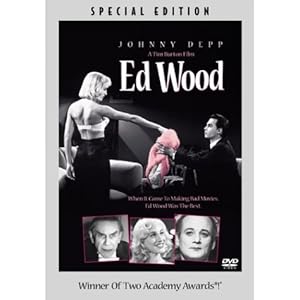
A sort of biopic about the career of one of Hollywood's most infamous directors, from around when he meets the great Bela Lugosi to the completion of Plan 9 from Outer Space, his most infamous film and maybe the worst ever made. Being a Tim Burton movie, it's not just a standard biopic, with a weird sense of humor reflective of the kind of mind that might produce crap like Plan 9. It's a very sympathetic story, showing Wood as a bright, friendly, enthusiastic man who just happens to make garbage. Johnny Depp is very good as Wood, though Martin Landau sort of steals the show, winning an Oscar for playing the morphine-abusing, vulgar, theatrical Lugosi. The rest of the cast is solid too, and the black and white cinematography is generally excellent. And I loved how the film's moment of triumph is centered around the filming of one of the worst things to ever appear on a screen.
Kicking and Screaming

A funny but also thoughtful comedy by Noah Baumbach, who's known by many as a frequent collaborator with Wes Anderson, and watching it you can envision how that partnership might have started. I found it incredibly easy to relate to the movie's main characters, but I expect that's true of most people who ever graduated from college and weren't sure what to do next. The four friends all stay together in town, unable to move on from their experiences for whatever reason. We get a really good idea of why they're friends in the first place, but also what might cause that friendship to end. Really, they're all just scared to get started on that whole real life thing, which I'm not sure anyone was fully prepared for. Solid acting, really good story, and it's just a funny movie, too.
Moonstruck

This is the kind of movie people talk about when they use words like "delightful". Moonstruck is kind of an oddball romantic comedy, starring Cher in a remarkably natural performance for someone I don't really think of as an actor as a widow who decides to settle for remarriage with someone she doesn't really love. Things change when she meets her future husband's brother, a one handed baker played by a charmingly unhinged Nicolas Cage. The two have nice chemistry, and things happen about the way you might expect. Also, Cher's dad is having an affair, and her mom suspects it but is too nice to make it into a tragedy. Olympia Dukakis does a really nice job with the part, and both women won Oscars for their work. The movie's sense of humor is definitely off-beat in an unexpected and likable way, and while nothing in the film is groundbreaking, it's pleasant to watch all the same.
Poltergeist

A horror film for the whole family, directed by Tobe Hooper and written and possibly actually directed by Steven Spielberg. Ignoring the debate over who really had creative control of this movie (I'm guessing the true answer involves the word "both"), it's a pretty decent little paranormal movie. A family gets terrorized by ghosts that can move furniture and suck people into another dimension filled with goo. There's a bit of humor, but it's mostly the kind of horror movie intended to elicit a few jumps without being truly terrible or horrifying. Not that most kids probably wouldn't be freaked out by it. The eventual explanation for what's going on is pretty unsatisfactory, but the climax itself is exciting enough. There are a few ideas here worth checking out, especially if you like a little jolt but don't want to see anything truly traumatic.

































